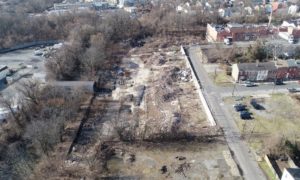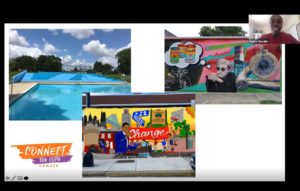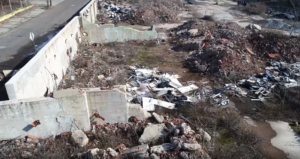 Fifteen high school students learned about environmental justice and advocacy from The Watershed Institute’s Policy Team as part of an after-school program run by UrbanPromise Trenton.
Fifteen high school students learned about environmental justice and advocacy from The Watershed Institute’s Policy Team as part of an after-school program run by UrbanPromise Trenton.
After learning about The Watershed Institute’s new Community Watershed Advocate Program (CWAP), UrbanPromise reached out to the Watershed’s Outreach Specialist Pri Oliveira to request some training for their students on environmental advocacy. UrbanPromise Trenton works to equip children and young adults with the skills necessary for academic achievement, life management, spiritual growth, and Christian leadership. They challenge youth to develop and realize their potential.
As part of four virtual sessions, the high school students learned the basics of how state and local governments work to protect the environment. They discussed issues that were important to them: clean air and water, access to parks, and the problem of illegal dumping.
 Environmental advocate Vedra Chandler of the Coopers Ferry Partnership shared her experience growing up in Camden, attending Harvard and pursuing careers in entertainment and business. She ultimately returning to her native city to lead a program, “Connect The Lots,” that is raising awareness of illegal dumping through the installation of public art projects. The students also watched an interview with Aaron T. Watson, Executive Director of The Mercer County Park Commission conducted by Jacque Howard of the Trenton 365 that addressed the importance of park access to all communities.
Environmental advocate Vedra Chandler of the Coopers Ferry Partnership shared her experience growing up in Camden, attending Harvard and pursuing careers in entertainment and business. She ultimately returning to her native city to lead a program, “Connect The Lots,” that is raising awareness of illegal dumping through the installation of public art projects. The students also watched an interview with Aaron T. Watson, Executive Director of The Mercer County Park Commission conducted by Jacque Howard of the Trenton 365 that addressed the importance of park access to all communities.
 Using a case study of an illegal dumping ground in East Trenton, the students learned how speaking out about these issues and making a case to government officials can bring about change. The Amtico Square property in East Trenton is a 3.5-acre vacant area that once was the site of various rubber factories and other industries. It was most recently used for warehousing and is close to where many of the students live. While the building that occupied much of the site was demolished in 2013, its concrete foundation still covers much of the site. A sampling of the ground below the foundation showed slightly elevated levels of contaminants, including metals and polycyclic aromatic hydrocarbons.
Using a case study of an illegal dumping ground in East Trenton, the students learned how speaking out about these issues and making a case to government officials can bring about change. The Amtico Square property in East Trenton is a 3.5-acre vacant area that once was the site of various rubber factories and other industries. It was most recently used for warehousing and is close to where many of the students live. While the building that occupied much of the site was demolished in 2013, its concrete foundation still covers much of the site. A sampling of the ground below the foundation showed slightly elevated levels of contaminants, including metals and polycyclic aromatic hydrocarbons.
The cleanup of this property was prompted by an environmental justice “listening session” that the state Department of Environmental Protection (NJDEP) organized last February. NJDEP wanted to know what priorities Trenton residents had and then embarked on action to clean up the site.
 At that listening session, according to a press release the students read, Trenton residents spoke up about their desires to halt the illegal dumping and clean up the site, which abuts the Assunpink Creek. Many parties had to work together to make the project happen including state and local government, community groups including the East Trenton Collaborative and Isles as well as United by Blue, a retailer with a commitment to cleaning up pollution from oceans and waterways. This brownfields site, which is largely located in a flood plain, eventually will become a park.
At that listening session, according to a press release the students read, Trenton residents spoke up about their desires to halt the illegal dumping and clean up the site, which abuts the Assunpink Creek. Many parties had to work together to make the project happen including state and local government, community groups including the East Trenton Collaborative and Isles as well as United by Blue, a retailer with a commitment to cleaning up pollution from oceans and waterways. This brownfields site, which is largely located in a flood plain, eventually will become a park.
After learning about the property, the students met with Jim Simon, Chair of the Trenton Green Team, a volunteer entity that works to foster a healthy and sustainable environment in Trenton. The students practiced public speaking by each making a comment about amenities that they felt would add to the neighborhood including community gardens and green infrastructure like basketball courts with permeable pavement. They also focused on the need for regular maintenance and keeping the park trash-free.
“I feel like we could actually make a change and it makes me happy,” said Anfry Mejia, 18. “It makes me happy that we are working to make a change in Trenton.”
Sophie Glovier, the Assistant Policy Director at the Watershed, said understanding how to work with local governments and community groups gave the students a sense of control, ownership, and ability to affect change in their community. The Watershed is committed to helping students from these communities learn how to advocate to improve the environmental conditions where they live.
“Our goal for the program was for the students to understand the importance of residents engaging with community groups and municipal government to address environmental issues and make changes they want to see in their city”, she said.
The Watershed Institute will apply the lessons learned from this program to expand its environmental advocacy programming in the future to other students from historically under-resourced communities.

